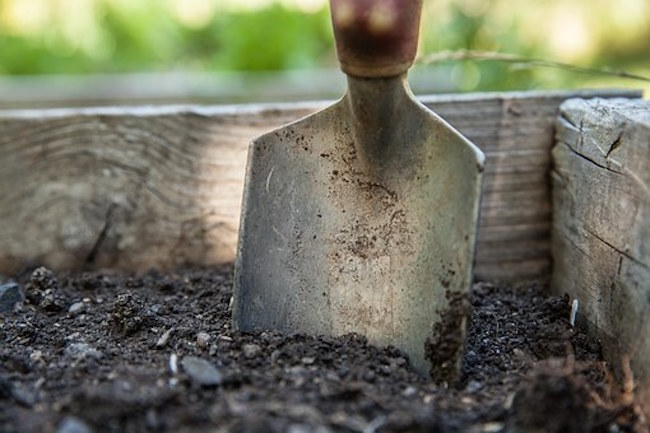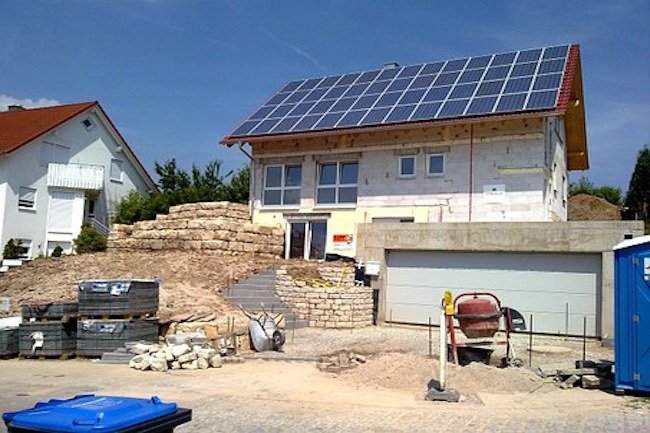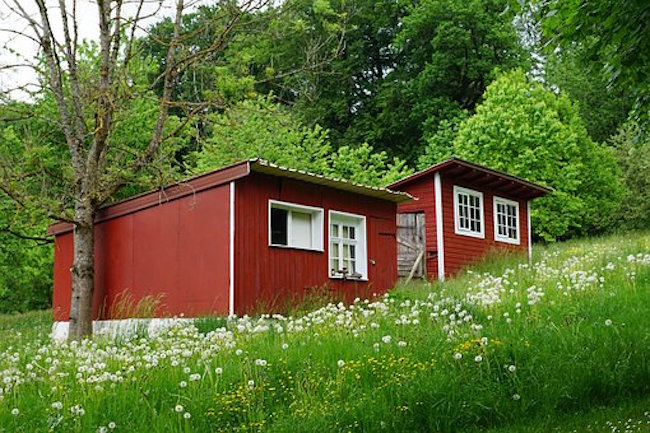Gardener, Canner, Hunter, Camper, Prepper, Survivalist? What’s In A Word? By Sandra Lane for The Organic Prepper
As the wife of a former over-the-road (OTR) Truck Driver, I used to joke with my kids that their dad and I could be divorced and they would never even know it. After all, he was only home on the weekends, and sometimes only every other weekend, so it was kind of like visitation rights… It became quickly evident by the looks on their faces that my sense of humor didn’t quite line up with theirs.
But that goes to show that a simple word can evoke emotions, and sometimes drama, that isn’t always intended.
Words can evoke powerful emotions in people.
The power of words has been recognized for a long time, and the phrase “The pen is mightier than the sword” is a metonymic adage, coined by English author Edward Bulwer-Lytton in 1839. Although Bulwer-Lytton was referring to the advocacy of an independent press over violence, the phrase still holds true today with just about any word usage. Yell “Fire” in a crowded hotel lobby and see what happens (No, please don’t do that.). Better still, with a few more precious words, catch a woman leaving a Beauty Salon and ask her how in the world they got her hair to turn such a beautiful green. Yes, words can certainly be fun and entertaining.
Words create imagery and have the ability to paint beautifully vivid pictures in our head, as well, unfortunately, as negative responses and/or reactions. Watch a few episodes of “Doomsday Preppers” and you’ll figure out it’s most likely the reason people look at us strangely when they find out we’re preppers ourselves. After all, according to that show, anyone who claims to be a prepper will certainly have hidden tunnels underground, secret passages and stashes, an expansive armory, and enough food and water in their homes and secret ‘Bug Out Locations’ to make a Wal-Mart Supercenter jealous.
If we look back in time though we’ll see that “prepping” was a way of life long before Y2K, long before the Dust Bowl in the early 1930s, and even further back than that.
According to Grammarlist, “Saving for a rainy day” is an idiom that can be traced at least as far back as the 1500s. Many of us remember our grandparents and great-grandparents putting loose change in a jar or “penny jug”, and some of us have even seen our grandparents stash bills under mattresses, in socks in the ‘sock drawer’, and in old dishes high up in the cupboard. If asked, the answer was usually “just saving for a rainy day”, accompanied by a little secretive smile.
As a side note, something mildly interesting; while digging for legitimate sources on that particular phrase, I came across some articles online that assigned the phrase to a play called “The Bugbears” written in 1580, where it was originally written as ‘Wold he haue me kepe nothing against a raynye day?’. (“The Dictionary of Cliches” by James Rogers (Ballantine Books, New York, 1985)
Certain words and phrases alter perception.
So where am I going with all this about word usage and saving for a rainy day? What does it have to do with prepping and SHTF? Perception and word usage. “Saving for a rainy day” is the same thing as what we’re all doing – we’re just doing it on a bigger scale and with perhaps more dire possibilities/circumstances.
As I said in the beginning, my kids were perfectly fine knowing that their dad was at work making money for the family and would be home on the weekend. Had we really been divorced (just celebrated 38 years, so obviously not), even with the same conditions in place, they would have turned into a blubbering mess.
This response to a word is being called Logomisia: from Greek logos, “words” + Greek misos, “I hate”, and is loosely defined as a strong dislike for a particular word (or type of word) based on its sound, meaning, usage, and/or associations. It’s also known as word aversion or verbal virus. Kind of like the response we get from using the word “Prepper”, or “Teotwawki”, or “Armageddon”.
Knowing my grandmother, had she asked me why I was hoping to can and store more food and water than I could ever possibly eat or drink in a lifetime, and had I answered with a common “Doomsday Prepper” answer like “We’re preparing for the end of the world as we know it”, she would have laughed at me. My grandmother, who went to church every Wednesday and Sunday, gardened, canned, dried, and ‘saved for a rainy day’. She would have told me I was ‘off my rocker’.
Now, most likely she would have said something like that because of her personal beliefs, not because of any word aversion. But people fear what they don’t understand, and fear drives people to do weird things, like laugh, mock, dislike, dismiss, and for the most part label as crazy.
Here’s why it’s important to choose your words carefully.
For operational security and family safety, let alone for all around safety during and after a disaster event, we never want to advertise that we’re preppers because that kind of information can end up in the hands of some very mean and/or dangerous people. But then, on the other hand, having a network of like-minded individuals living in a neighborhood is a good thing. So how do we safely find or identify those who would be a welcome addition to a real-life group without scaring them away or making them think we’re ‘off our rocker’? By carefully choosing the words/phrases we use.
Below is a list of terms/phrases/excuses that I’ve come up with that we can use aside from Prepper (just don’t even use the phrase Doomsday Prepper), hopefully, at the very least, to sniff out some like-minded people, and maybe even encouraging others to do the same as us.
- Just saving for a rainy day.
- It’s kind of like an insurance policy – I save things now so I don’t have to pay for it later.
- I’m not really sure about the stability of the dollar so I like to keep some silver/gold bullion at the bank.
- Just putting something little back so we don’t have to worry about job loss.
- I’m a Canner – I love to can my own foods; that way I know what goes into it – no preservatives!
- I like to can foods to give as gifts.
- I like to make jars of homemade food to have on hand when people are sick and don’t feel like cooking
- I’m a Gardener – I just love to be out there growing things.
- I inevitably grow too much so I can/dry it for later; why let it go to waste?
- My wife/husband loves to cook with fresh herbs so we grow our own.
- Competition shooting is my hobby and ammunition is so expensive- it’s cheaper just to police my brass/casings and reload my own.
- Food just tastes so much better cooked over an open fire.
- I’m just uncomfortable about not having immediate access to water when I’m thirsty, or aspirin when my head is pounding, so I carry a backpack to hold it instead.
- Sharpening my kitchen knives is a lot cheaper than buying a new set.
- We’re just a craft-oriented family. We like to sew, make quilts, garden and can the food; the kids even enjoy making candles.
- I have this rare disease that makes me allergic to beef (this actually exists by the way), so I hunt deer for my red meat.
- This farm was passed down to us from my great grandparents – I’m not about to give it up.
Note: I would have suggested that Survivalist be used in place of Prepper, but evidently being a survivalist is worse than being a prepper. And we all know the two are really very different.
Choosing your words carefully can help you network
As you can see, there are a lot of excuses and reasons that you can give a nosy person who just has to know why you’re doing things that are different from others. Obviously, you don’t really have to explain yourself to anyone – it’s none of their business.
Oftentimes though you can reach a fellow prepper/survivalist by just using the right words or phrasing that they, in turn, pick up on and reply to, allowing you both to instantly know you’re of the same mindset. The more like-minded people you have in real life, the better your chances may be to survive later.
While this isn’t true in all cases (homesteaders and those with lots of acreage are usually capable of existing without networking), it can most certainly be true in urban settings where it’s difficult to produce enough goods for one family for a year.
So choose your words carefully and wisely, and keep an ear out for responses. Remember that situational awareness is key also. You might be a bit passive regarding the neighbor who’s rarely home because he’s always on vacation – until you happen to see his unknown roommate target practicing in the backyard at night with a bow. Maybe they would now be interesting people to invite to a small cookout…?
What do you think?
Are you careful about how you describe your prepping and survivalist activities to people? Which words do you use? Please share your thoughts and ideas in the comments.
About Sandra
Sandra D. Lane is city born and bred but is a country girl at heart, a published artist (acrylic paintings) and photographer, fellow prepper, animal advocate, handgun competition participant, and Theologian. She currently lives with her husband of 38 years in Tennessee with an ever-growing number of outdoor stray cats.




